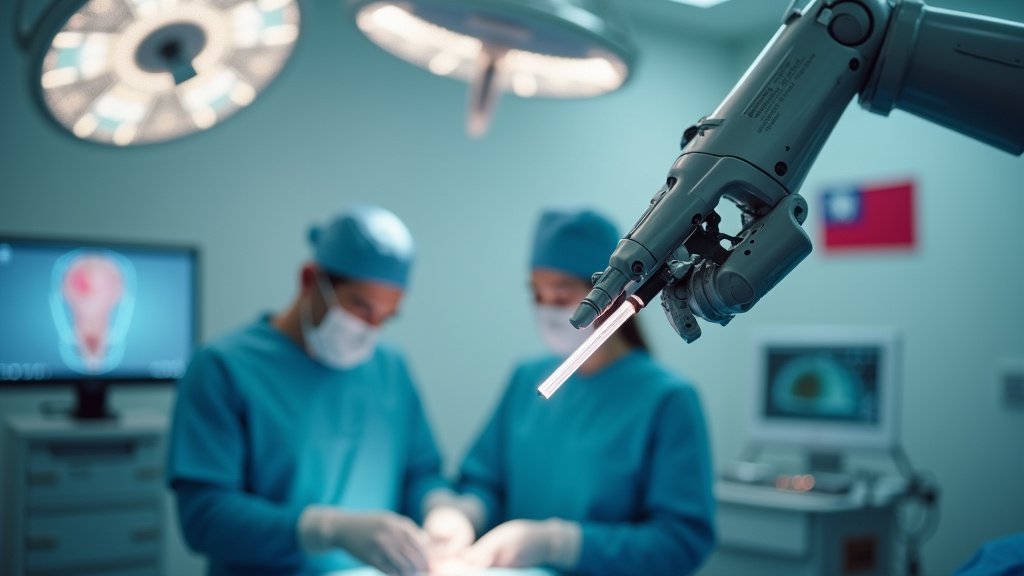Taipei, Taiwan – In a strategic move to cement its global standing in advanced technology, Taiwan’s Ministry of Economic Affairs (MOEA) Department of Industrial Technology (DoIT) has unveiled three significant AI robotics initiatives. These ventures are designed to drive innovation in smart healthcare and manufacturing, capitalizing on emerging opportunities and reinforcing Taiwan’s position as a leader in industrial transformation.
These initiatives, prominently showcased at the 2025 Taiwan Automation Intelligence and Robot Show (TAIROS), highlight Taiwan’s pivot towards ‘smart manufacturing.’ The collaborations involve key partners such as China Steel Machinery, National Taiwan University Hospital (NTUH), and Changhua Christian Hospital, aiming to integrate artificial intelligence with robotics for cutting-edge applications. This push aligns with Premier Cho Jung-tai’s vision to advance Taiwan’s AI infrastructure and industrial upgrading, supported by a substantial government investment exceeding NT$100 billion (US$3.3 billion).
Strategic Vision: Evolving Towards Smart Industry
The MOEA’s commitment to AI and robotics is a response to global trends, including supply chain restructuring and the increasing demand for intelligent automation. DoIT Senior Technical Specialist Tsung-Hsun Tsou emphasized that Taiwan is transitioning from conventional manufacturing to ‘smart manufacturing,’ a move supported by years of accumulated R&D, patent acquisition, and technology transfers. In the past six years, DoIT has secured 70 patents worldwide and completed over 300 technology transfers, generating nearly NT$12 billion in industrial value and private investment. This proactive approach aims to create an ‘intelligent living circle’ where smart technologies enhance societal well-being across all sectors.
Revolutionizing Healthcare Through AI Robotics
The initiatives significantly target the healthcare sector, promising to enhance patient care and operational efficiency. A cornerstone development is Taiwan’s first AI endoscopic robot, a collaboration with National Taiwan University Hospital. This advanced system is designed to improve diagnostic safety and precision, while also reducing procedural risks by minimizing the need for external punctures.
Further enhancing the healthcare landscape are medical service robots aimed at alleviating the workload of medical professionals. These robots are projected to reduce healthcare workloads by 20% by automating routine logistics and instrument preparation tasks. This crucial support allows healthcare staff to focus more intently on patient care. Partnerships with institutions like Changhua Christian Hospital are also contributing to AI-driven diagnostic tools for conditions such as diabetic retinopathy, improving accuracy and efficiency. Additionally, AI-powered robotic arms for precise medication dispensing and mobile robots for carrying supplies and disinfection are being integrated, fostering a more comprehensive smart healthcare ecosystem.
Advancing Smart Manufacturing with Intelligent Automation
In the manufacturing domain, the MOEA’s initiatives focus on boosting productivity and reducing costs through AI-driven automation. A key featured innovation is a digital twin welding robot, developed in collaboration with China Steel Machinery. This sophisticated system utilizes simulation and interactive control to deliver customized, ultra-precise welding, doubling efficiency and halving costs for large-scale production, particularly for complex manufacturing needs like shipbuilding.
These efforts are part of a broader national strategy to infuse AI and robotics into traditional industries, thereby enhancing overall competitiveness. Leading Taiwanese manufacturers, including Foxconn, HIWIN, and Delta Electronics, are actively involved in developing integrated hardware and software solutions for intelligent manufacturing. The MOEA’s emphasis on system integration and the development of collaborative robots further strengthens Taiwan’s role in global advanced manufacturing supply chains.
Cultivating Taiwan’s Technological Future
These AI robotics initiatives represent a critical step in Taiwan’s long-term economic strategy, aiming to bolster global competitiveness and foster innovation. The government’s commitment extends to talent development, with plans to cultivate AI and robotics skills across the workforce. By promoting cross-domain collaboration and building a robust AI robotics ecosystem, Taiwan is positioning itself to capture significant market share in the rapidly expanding global AI robotics sector. The success of these endeavors is anticipated to yield substantial R&D advancements, new patents, and technology transfers, further solidifying Taiwan’s reputation as a hub for technological innovation and smart industry solutions.





